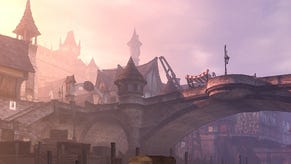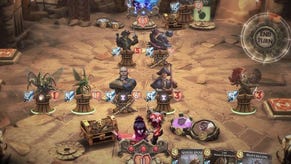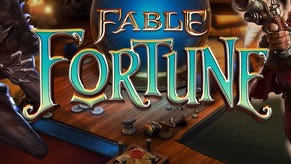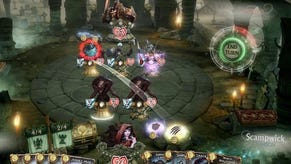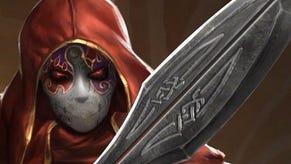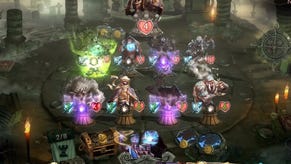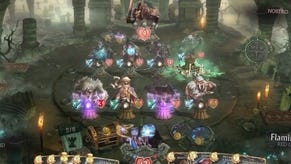How Fable Fortune survived the death of Lionhead
Good and evil choices.
When Microsoft announced the shock closure of long-running developer Lionhead Studios back in March 2016, Fable Legends fell by the wayside. What most people didn't know at the time was there was another Fable game in the works at Lionhead, one that hadn't even been announced yet.
Unlike Fable Legends, though, this secret Fable game survived Lionhead's closure. That secret game was Fable Fortune, and this is the story of its long and winding journey to launch.
Fable Fortune, a Hearthstone-like collectible card game set in the Fable universe, sprang into life in October 2014 after the small team responsible for Fable Anniversary wrapped up the Steam version of the game. With Fable Legends development in full swing, the Anniversary team was asked to come up with an idea for a mini-game of companion game that would slot into the big Xbox One and PC project. Lionhead had form when it came to Fable companion pieces, of course, with Fable: Coin Golf and Fable: Pub Games both past successes.
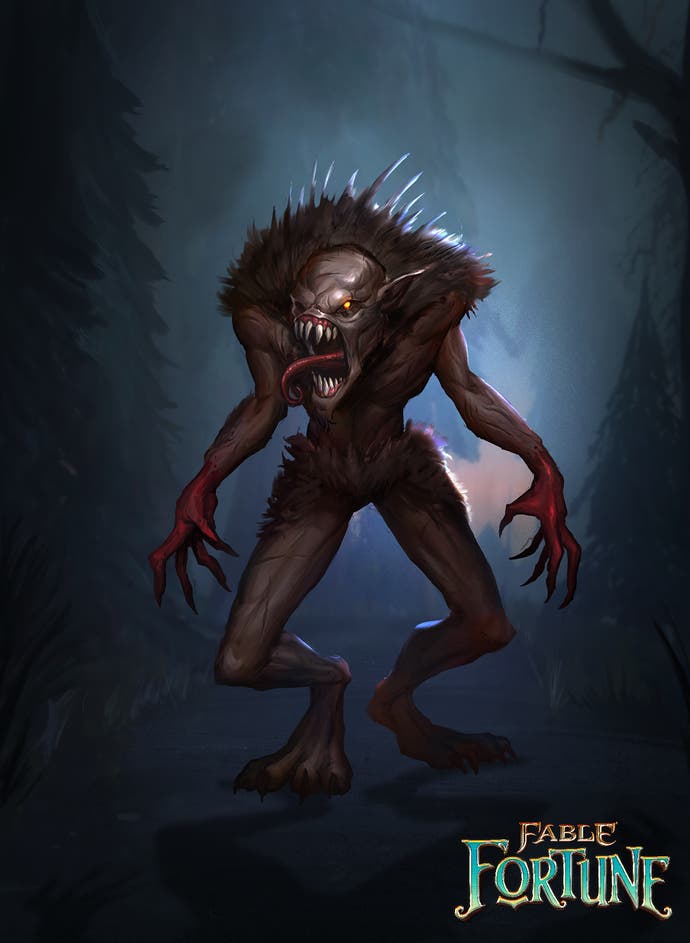
The idea to make a collectible card game came to the team almost immediately. Lionhead designer Mike West, a big physical collectible card game fan, had unsuccessfully pitched a CCG for Fable 2 years prior. Blizzard's Hearthstone, though, had made CCGs cool, and so a CCG for Fable Legends was a much easier sell.
Fable Fortune's design mantra was established early doors: even though it was a card game, it had to be Fable. It had to have the famous Fable humour. It had to have quests. It had to have some kind of god and evil morality system.
Lionhead wanted to integrate the game into Fable Legends, but also make it so players could access it externally. The idea was while you were in Legends waiting for a match or your friends to turn up, you could play Fortune for a bit, then jump straight back into Legends. And if the developers could get Fable Fortune onto mobile phones and tablets, players would have something Fable-related to play while they were away from their Xbox One.
Why would you bother with Fortune? Apart from it being fun to play, you could also unlock items for use in Fable Legends - and vice versa. Play Fable Legends and you would unlock card packs for Fable Fortune. Play Fable Fortune and you would unlock items for use out on the battlefield in Fable Legends. That sort of thing.
Lionhead's leadership team liked the idea, and told the group to get to work on a PowerPoint that would hopefully secure approval from Microsoft itself. This is where the fun with gates began.
Microsoft Studios uses a gating system to not only greenlight projects, but act as internal milestones. The requirements per gate vary depending on project size, but all projects face scrutiny. When you pass through a gate you unlock some development funds. Gate number one: concept approval. Pass that gate and the Fable Fortune team would unlock enough money to build a prototype.
In late 2014, Kudo Tsunoda was in charge of Microsoft's first-party studios. Tsunoda, the public figurehead of Kinect, was in the process of taking over Xbox game development from the outgoing Phil Harrison. The Fable Fortune development team would have to get the thumbs up from Tsunoda before moving onto pre-production. It turns out the gate number one meeting involved not on Tsunoda, Phil Harrison and the Lionhead leadership team, but Xbox boss Phil Spencer, who alongside his entourage was on one of his regular tours of the UK. No pressure then.
"This was very much like, yeah, if we fuck up, then the project gets canned and we have to go and find some other work to do," remembers producer Craig Oman. Fable Fortune, which ex-colleagues tell me was "Oman's baby", was pitched via a rudimentary PowerPoint presentation with 2D graphics viewed from a top-down perspective. But the essence of what the game was was there.
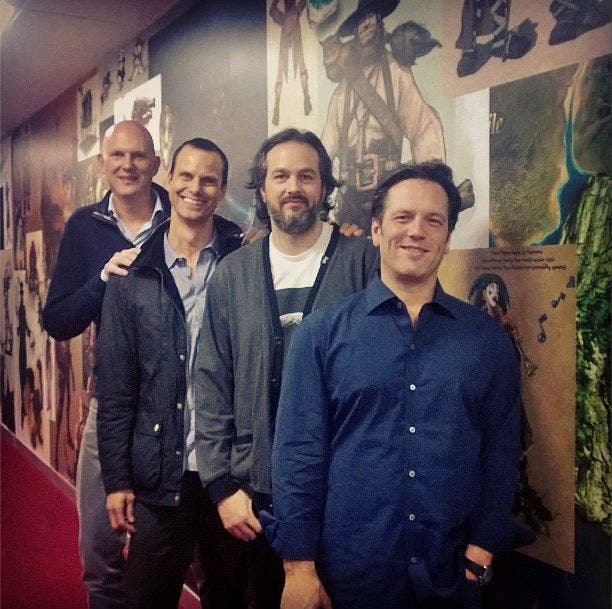
The high-profile audience made for a nerve-wracking presentation. Phil Spencer, Phil Harrison and Kudo Tsunoda, three powerhouses of Xbox, laid in wait. But it was Tsunoda who worried Oman most.
"Phil's great. He's real easy to talk to," Oman says says. "Kudo is... I really like Kudo but he can be very difficult to present to.
"He might not even look like he's paying attention to you, but he's normally taking it all in. But he wants to know the answer to the question he's got. He doesn't really give a shit about the presentation you've spent two months preparing for and you've practised or that you've got this flow ready to go. He'll have a question and he just wants the answer now. You can't just say, well we're going to get to that in seven slides' time, if I can just take you on the journey... he will be like, no, go straight here."
This description of Kudo Tsunoda's meeting style - backed up to me by another ex-Lionhead member of staff - explains the nervousness Oman felt during the Fable Fortune concept pitch. But, Oman says, it was something he got used to - and even managed to prepare for.
"He did that - every single presentation we ever did with Kudo," Oman says. "You learn after a while, he's just going to throw you a curve ball, so you've got to be able to move around. It's infuriating and difficult to work with, but it's good because he knows what he wants and he doesn't want to mess around. So if you don't have an answer to the question he's got, you're done. You're just wasting his time. But once you know that's coming, it's a bit easier. You tend to frontload as much stuff as well, so it's all there."
Fable Fortune's concept presentation was high level, as you'd expect, and designed for those unfamiliar with the CCG genre. It ran through how the game would work and had a section devoted to explaining how CCGs work. It turns out Oman needn't have worried about the latter.
"We didn't really know how much the execs would know about CCGs," Oman says. "Mike [West, Fable Fortune creative director] was up doing his talk, and I was standing off to the side. I was just behind Phil Spencer. Mike's talking away and I see Phil open up Hearthstone, and I was like, yes!
"We asked, are you familiar with CCGs? And he's got his account already open. It's like, good, okay, we don't have to explain why this is a good space to go into.
"There was somebody else there, one of the finance guys, he was this uber Magic the Gathering fan. He was like, I've got a $50,000 Magic collection, so you don't have to explain this to me. There were a couple of people who were big votes who were like, yes!"
X-Factor style, the votes were cast, and Fable Fortune passed the first gate. But the thumbs up came with difficult questions, the most difficult of which came from Phil Spencer himself: how Fable Fortune would beat Hearthstone?
"We were like, what the fuck are you talking about?" Oman says. "We're talking about a very small team that's trying to do something that's inside of Legends. But Phil's brain is already working: well look, if you're going to do this, do it properly. How are you going to take them on?
"And that was like, oh shit! Actually, that's where we should be thinking. Nobody's saying we're going to beat Hearthstone. It's massive. But if you're going to make a football game, you've got to ask yourself, how are you going to beat FIFA or Pro Evo? You should be setting your ambitions right at the top."
Inspired by Spencer's question, the developers began to think of Fable Fortune more as a standalone game than a Fable Legends mini-game. They explored making Fable Fortune a separate app that would be "deeplinked" with Legends on an Xbox One. So, you would be in Legends, press a button and load up Fortune as a different app. Because the Xbox One can run a game and an app at the same time, both Legends and Fortune could theoretically run on the console at the same time without ever shutting down - and at full quality.
With gate one successfully navigated, the developers set to work on a prototype. At this stage, they began working with fellow British developer Mediatonic, whose designers drew Fable Fortune's cards on pieces of paper, cut them out and used them to play the game in real life. Three months were spent thrashing out the design of the game and building a prototype that would, hopefully, get Fable Fortune through gate number two.
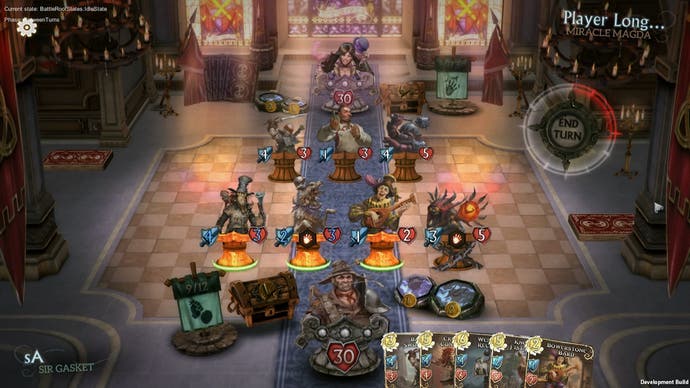
The Fable Fortune prototype was a flash game with a top-down camera and basic art. "It looked like something first year of college game project," Oman laughs. "But for us it was all about the mechanics and the flow and actually, how does this play, and is it fun?"
Oman and co took this "crappy-looking 2D card game" to the gate two meeting and, once again, an expectant Kudo Tsunoda.
"Kudo is an impatient man," Oman says. "We were like, this is basic. There's not really much to do in terms of an interaction when it's not your turn. You kind of have to try and coach people through it. Kudo's the kind of guy who's like, I just want to play. I'll do it! I'll do it! And if it's not his turn he's then clicking on everything on the screen. What do I do when it's not my turn? You're like, it's a prototype."
If the prototype fell flat, one test screenshot, made in the Unity game engine helped seal the deal. This was done with separate art to show the Fable-esque art style the developers were going for. It worked. The funds for production were unlocked, and Fable Fortune looked like it could be the real deal.
"We were full on from that point," Oman says. Throughout 2015 the developers fussed over artwork for the cards, the way the cards worked, turning the 2D graphics into 2.5D, and of course game modes and mechanics. Gate three - aka "our one year out" - fast approached. Were Microsoft confident Fable Fortune would hit its planned release window alongside Fable Legends? "If you're not at that stage, that's the point where you get pushed back," Oman explains.
With Fable Fortune on a much quicker timeline than other bigger projects, the gate three meeting was more about getting to the point where the developers felt comfortable letting people playing the game. "Gate three for us was more like, are we ready to announce and go straight into closed beta?" Things were moving quickly.
As 2015 bled into 2016, Oman began thinking about gate four, which revolved around a pre-launch greenlight. Pass this gate and Fable Fortune would get a go for launch and any marketing money it had been assigned. Even at this stage a project can get canned, as Oman explains:
"It can be cancelled at any point really. It's a big risk with games as a service, especially free-to-play games. Launching is a huge financial commitment. It's not like a normal boxed product where, for example, we launch it, we sell 200,000 units and don't make enough money so we're done. If you're going free-to-play and you launch it, you're not making any money until people pay through the microtransactions. But you're then committing to running that for six months, nine months or a year, to try to get it to the point where it's making money.
"Right up until launch is the most dangerous point. That's the point where it's the easiest to can it. If nobody's playing it, you don't have to worry about reimbursing everybody, you don't have to worry about supporting the servers for x amount of time. There are European laws now where if you're running a free-to-play game, you can't just shut it down. You've got to give people a certain notice period. For any title like that, gate four or whatever you call it, at whatever studio you're working in, that's the point where it's like, well, do we really want to do this? Because once we do this, that's a huge commitment. That's the same for most games as a service, even if you're paying for them at launch. It's still a big commitment."
(For those wondering, gate five would have been about Fable Fortune post-launch, and how it would have been sustained.)
In early 2016, Oman began wondering when, where and how Lionhead would announce Fable Fortune to the world. He considered big video game events such as PAX East and E3. But Fable Fortune couldn't be announced before Fable Legends went into open beta. That would have been awkward for Lionhead and would have sparked more questions about the studio's divisive big new game.
Still, by that point Fable Fortune was up and running as an internal alpha on Microsoft's servers. The developers had given people access to the game and feedback was positive.
"And then Lionhead got shut down in March, and we were like, ah. Shit."
Over the course of Fable Fortune's development, Oman and co had flown out to Microsoft's headquarters in Redmond to show people the progress they'd made. "It was always something that was important for us to do at Lionhead," Oman says, "go to Redmond and be like, hey, we're still here, still making games."
Oman had a trip to Redmond planned for March, but in February the meeting was unceremoniously cancelled. You don't have to go to Redmond anymore, he was told.
"I was like, oh! When are we going? Are they coming over here? What's going on? We'll rearrange it. I was fobbed off. I was like, okay. I debated. I argued with people. Why are we not going? We should be doing this! I was basically shut down. I was like, that's a bit weird. Why am I being shut down like this for something we should be doing?"
Oman had turned down a skiing trip with friends because it would have clashed with the planned Redmond trip, but with the Redmond trip cancelled, he thought he may as well go on holiday. Oman asked his boss, Hanno Lemke, general manager of Microsoft Studios Europe, for the week off.
"He was like, yeah, send me an email and I'll get it approved," Oman remembers. "I'm like, okay. Normally people would just be like, sure, take the holiday. So I sent him an email and he's like, okay, well, I'll look at it. I'm like, okaaaaay..."
A couple of days passed. Nothing from Lemke. Oman, understandably, followed up.
"I was like, hey, did you look at that holiday request? I need to go! And he was like, yeah, actually, there's a meeting next week and I'd really like you to be here to be a part of that. I was like, okay, what meeting is taking part that I need to be here for? Can't I Skype in? He was very much like, look, you just need to be here. I was like, right, okay, fine.
"I had a lot of suspicions. This was pretty weird. I thought that was Legends getting cancelled. It had been going through a rough patch, not so much from the development. The development felt like it was starting to come together a bit more. But internally, looking at all of the numbers, there were some serious questions there. I then put two and two together and thought, that's probably going to be Legends."
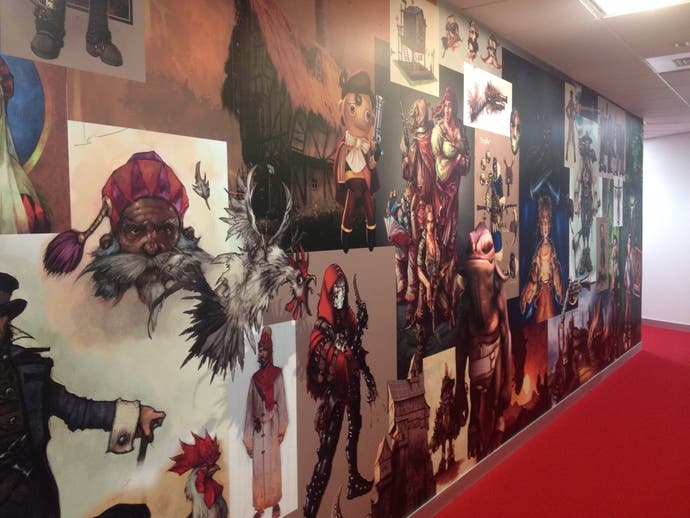
Oman worried he might be made redundant. In fact, he had already been made redundant from Lionhead years beforehand, while working on the cancelled Milo & Kate project. Could history repeat itself?
"You look at what's going on at the studio and assess your stability and your security," he says. "How many other people are doing your role? It's not pleasant. I was looking at it and I was like, well, you know, we'll see what's going on. Fortune was going well at that point. If they cancel Legends, what are they going to do with Fortune?
"I wasn't going into work on Monday morning feeling great. Then they booked in the all-hands meeting, and I was like, yeah, shit's going down now.
"We used to play football every Monday and every Friday at the local sports park. I was like, well, fuck it, I'm going to football. I left 10 minutes early that day. It doesn't really matter. Nobody's going to give a shit after whatever's going down after lunch. We played football, I remember making jokes, I'll see you all down the job center tomorrow! It's all half-joking, half a bit worried. But what can you do? You just have to wait for the meeting.
"It was an all-hands meeting for 2pm. In the morning all the LT are getting told. You see them running around. You see the leadership team's attitude completely change. You're like, hey. How's it going? And they're like, hmm. Can't say anything. So we played football, came back, went down to the cafe where we had the all-hands meetings.
"We were in total shock. It wouldn't have been a surprise if they'd canned Legends, just because it was a big project and a lot of time and money had gone into it already. It wasn't going to be a cheap project to run long-term. But closing the whole studio? It was a complete surprise.
"We were in a separate building. We were in the ATR [Alan Turing Road] building across the road and upstairs. My team was over there. We just wandered back in a daze. They've got all the contractors over in the other building to tell them - they were all basically told to clear their desks and don't bother to come back. So we were then all walking back across at the same time. It was like the end of a football match where both teams lost."
After finding out Lionhead would be shut down, most of the staff went to the pub. Oman, however, went home. Then and there he decided to start his own studio, rescue Fable Fortune and finish it. "Even at that point we felt we had something special."
The next morning he went into Lionhead's office in Guildford, knocked on Hanno Lemke's door and asked if he could have Fable Fortune. Lemke said yes. "It was pretty much as easy as that."
Phil Spencer had given Hanno Lemke the authority to decide the fate of the various projects at Lionhead. Lemke said yes to Oman's request for Fable Fortune. Attempts to save Fable Legends, of which there were a few, never made it.
Oman, alongside creative director Mike West and technical director Marcus Lynn set up in a Lionhead meeting room (Lionhead stayed open to staff for a couple of months after the closure announcement was made) and filled in the form to register their company. The developer was originally going to be called Owl, combining the first letters of each of their surnames. Then they came up with Flaming Owl ("like the phoenix from the flames"), but it turns out there's an obscure rock band called Flaming Owl. So they simply added an f to the owl. Flaming Owl became Flaming Fowl. Then they put Studios on the end as a nod to Lionhead Studios. Flaming Fowl Studios was born.
The name came with an added bonus.
"It makes our initials FFS, which we took great enjoyment out of because every single contract you ever do with anybody, they always abbreviate the company name. So every single contract we have is just covered in FFS, FFS, FFS."
While Microsoft gave FFS permission to make and release Fable Fortune under an official license, there was no funding in place ("Microsoft gave us their blessing, but they didn't exactly give us a cheque for $2m as well"). Oman weighed up his options, and decided to launch a Kickstarter.
At this stage, Fable Fortune hadn't been announced, although the morning Lionhead was shut down an article about someone who had reverse-engineered a file on a Windows 10 Store game and found mention of Fable Fortune hit the press. "We saw it and I sent emails about it in the morning, going, shit, I hope nobody picks up on it," Oman says. "Four hours later, nobody seemed to care about that story because Lionhead got shut down."
FFS announced Fable Fortune the day before its Kickstarter launched on 31st May 2016. They asked for £250,000. £58,852 was pledged by 1536 backers, and funding was cancelled on 21st June.
Looking back, Oman admits he shouldn't have launched the Kickstarter so soon after announcing the game. The developers struggled to explain what kind of game Fable Fortune was. Fable fans wondered why this game existed and Fable 4 did not. And on the flip side of the card, FFS struggled to explain to the CCG crowd why Fable Fortune was a serious game for them, and not just a Fable spin-off.
"Why don't you make Fable 4? Why don't you remaster Fable 2? It's not an option we had," Oman stresses.
"We were the team that was working on this. We wanted to see our project out and finished, that we'd spent two years by that point working on. People just don't get the fact it wasn't an option. We couldn't go to Microsoft and say, hey, can we have the Fable IP? Can we make Fable 4? Even if they said yes, where do we get the money for that? We had a project we were working on that was near completion. It was like, if we can get support to do this, we can finish it and get it out."
Did FFS ask for too much money?
"No," Oman counters. "We asked for a realistic amount. We didn't have other options. I wasn't going to ask for £50,000 and say I'd try and get more. We didn't want to take £50,000 off of people and then be like, actually we can't make the game. We felt like we had to be realistic about it. Maybe we were too honest."
Thankfully for FFS, Mediatonic, the company Oman had originally contracted to help build Fable Fortune, stepped in to fund the game. Mediatonic became Fable Fortune's publisher. "It's amazing how things work out," Oman says.
Fable Fortune launched as a Steam Early Access game and on Xbox One and Windows 10 PCs in June 2017, two-and-a-half years after getting the thumbs-up from Phil Spencer, Phil Harrison and Kudo Tsunoda during the gate one presentation, 15 months after Lionhead was shut down and a year after its Kickstarter failed. It has been a long and winding journey to launch for a project that so far has refused to die.
"It's all pretty surreal," Oman says. "This project has kept going and kept running. Hopefully it works out."
Fable Fortune's journey is not yet over. In many ways, it's going through its toughest period. Oman says the launch has been "a bit of a mixed bag". The game is doing okay on Xbox, but not so well on Steam - despite positive feedback from players. And FFS still runs up against those who wonder why the developer isn't making Fable 4 instead.
"On Xbox especially we've got people leaving one star reviews and saying, make Fable 4. That will be the only comment on the review. It's like, great. Thanks for your support. Really great to see you looking after the ex-Lionhead devs. I say they should be a bit more original and give it a four-star review. Make Fable 4, four stars. And then we'd both be happy.
"The other comment is people saying it's a cash grab. How? Go and explain that one to me. Go and explain that to my bank balance."
Microsoft has had no involvement with Fable Fortune since they closed Lionhead. "They've given us a huge amount of trust," Oman says. "It's very much our responsibility not to do anything that would damage the brand or the IP.
"I think Microsoft still has faith in the brand. I don't think we've seen the last of Fable."
The plan is to switch Fable fortune to free-to-play early 2018 and soon after launch it proper. The hope is it'll prove successful enough for FFS to continue working on it, supporting the community with regular seasons of play and new cards.
"It's been stressful," Oman reflects. "The last year year has been a bit of a blur in some ways, but it's just incredibly stressful. It's hard for anybody to really understand or appreciate what we've got on the line to do something like this. From an emotional point of view, it just takes over everything you're doing.
"Having a community, it energises you. You feel better about everything when you know there's a group of people who appreciates what you're doing. It also makes you work harder. You know you don't want to disappoint them. It's good."
An adventure, I suggest. Just like playing Fable?
"Yeah. Good and evil choices."





